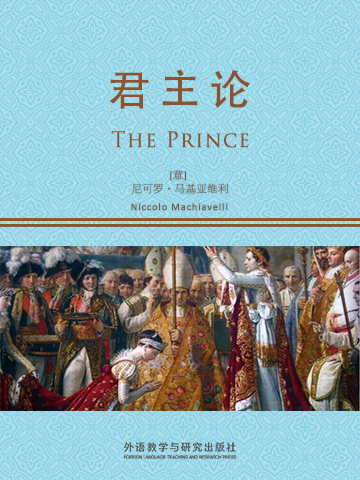欧洲历代君主的案头之书,政治家的最高指南。
The Prince is sometimes claimed to be one of the first works of modern philosophy, especially modern political philosophy, in which the effective truth is taken to be more important than any abstract ideal. It was also in direct conflict with the dominant Catholic and scholastic doctrines of the time concerning how to consider politics and ethics.
本书是意大利政治家、思想家尼可罗·马基亚维利的代表作,是一本毁誉参半的奇书,一直被奉为欧洲历代君主的案头之书,政治家的最高指南,统治阶级巩固其统治的治国原则,是人类有史以来对政治斗争技巧最独到最精辟的解剖。
The Prince is a 16th-century political treatise by the Italian diplomat and political theorist Niccolò Machiavelli. From correspondence a version appears to have been distributed in 1513, using a Latin title, De Principatibus (About Principalities). However, the printed version was not published until 1532, five years after Machiavelli's death. This was done with the permission of the Medici pope Clement VII, but "long before then, in fact since the first appearance of the Prince in manuscript, controversy had swirled about his writings".
- Dedication: To the Magnificent Lorenzo Di Piero De' Medici
- Chapter I: Of the Various Kinds of Princedom, and of the Ways in Which They Are Acquired
- Chapter II: Of Hereditary Princedoms
- Chapter III: Of Mixed Princedoms
- Chapter IV: Why the Kingdom of Darius, Conquered by Alexander, Did Not, on Alexander's Death, Rebel Against His Successors
- Chapter V: How Cities or Provinces Which Before Their Acquisition Have Lived Under Their Own Laws Are To Be Governed
- Chapter VI: Of New Princedoms Which a Prince Acquires With His Own Arms and by Merit
- Chapter VII: Of New Princedoms Acquired By the Aid of Others and By Good Fortune
- Chapter VIII: Of Those Who By Their Crimes Come to Be Princes
- Chapter IX: Of the Civil Princedom
- Chapter X: How the Strength of All Princedoms Should Be Measured
- Chapter XI: Of Ecclesiastical Princedoms
- Chapter XII: How Many Different Kinds of Soldiers There Are, and of Mercenaries
- Chapter XIII: Of Auxiliary, Mixed, and National Arms
- Chapter XIV: Of the Duty of a Prince In Respect of Military Affairs
- Chapter XV: Of the Qualities In Respect of Which Men, and Most of all Princes, Are Praised or Blamed
- Chapter XVI: Of Liberality and Miserliness
- Chapter XVII: Of Cruelty and Clemency, and Whether It Is Better To Be Loved or Feared
- Chapter XVIII: How Princes Should Keep Faith
- Chapter XIX: That a Prince Should Seek to Escape Contempt and Hatred
- Chapter XX: Whether Fortresses, and Certain Other Expedients to Which Princes Often Have Recourse, are Profitable or Hurtful
- Chapter XXI: How a Prince Should Bear Himself So As to Acquire Reputation
- Chapter XXII: Of the Secretaries of Princes
- Chapter XXIII: That Flatterers Should Be Shunned
- Chapter XXIV: Why the Princes of Italy Have Lost Their States
- Chapter XXV: What Fortune Can Effect in Human Affairs, and How She May Be Withstood
- Chapter XXVI: An Exhortation to Liberate Italy from the Barbarians
- 书评 写书评
- 笔记
-
书评加载中...























 京公网安备 11010802032529号
京公网安备 11010802032529号
笔记加载中...